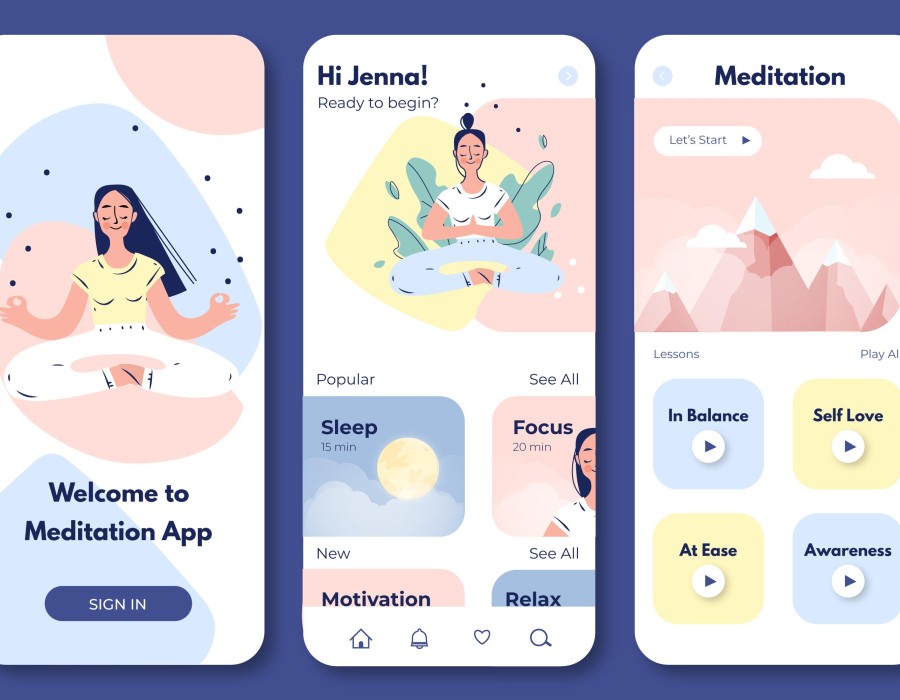Mental health apps are becoming an integral part of the healthcare industry, offering individuals accessible tools to manage their mental well-being. With the growing demand for digital mental health solutions, it’s essential for developers to include features that cater to diverse user needs. Whether you’re creating a new app or enhancing an existing one, here are the top features every mental health app should have in 2025.
1. Personalized User Profiles
Personalization is key to enhancing user engagement. By allowing users to create profiles, the app can deliver tailored recommendations based on their mental health history, preferences, and goals. Features like mood tracking and behavior analysis can further refine the user experience.
2. AI-Powered Chatbots
Artificial intelligence has revolutionized mental health apps by enabling 24/7 support through AI-powered chatbots. These bots can offer guided conversations, answer common queries, and provide coping strategies, ensuring users receive immediate assistance when they need it most.
3. Teletherapy Integration
Virtual therapy sessions are a cornerstone of modern mental health care. Apps should offer teletherapy features, including video calls, secure messaging, and appointment scheduling, to connect users with licensed therapists. Ensuring HIPAA compliance and data encryption is vital for maintaining user trust.
4. Guided Meditation and Mindfulness Exercises
Mindfulness and meditation are proven techniques for stress reduction and emotional balance. Mental health apps should include guided sessions, breathing exercises, and daily mindfulness practices. Integration with wearable devices can also enhance these features by providing biofeedback.
5. Mood and Symptom Tracking
Mood tracking helps users identify patterns in their emotional well-being. Advanced features, such as symptom trackers for anxiety, depression, or PTSD, can provide users and their therapists with valuable insights, enabling more effective treatment plans.
6. Community Support Forums
A sense of community can be immensely beneficial for mental health. In-app forums or group chats where users can share experiences and support each other can foster a sense of belonging. Moderated discussions ensure a safe and respectful environment.
7. Gamification for Mental Health Goals
Gamification can make mental health management more engaging. Features like streak tracking, rewards for completing tasks, and interactive challenges can motivate users to stick to their routines and achieve their mental health goals.
8. Emergency Support Features
In crisis situations, users need immediate access to help. Apps should include an emergency support feature that connects users to hotlines, crisis counselors, or trusted contacts with just a tap. Geolocation services can further enhance this feature by directing users to nearby resources.
9. Educational Resources
Educating users about mental health is crucial for reducing stigma and promoting awareness. Apps should provide articles, videos, and infographics on various topics such as stress management, self-care tips, and understanding mental health conditions.
10. Multi-Language Support
To reach a global audience, mental health apps must offer multi-language support. Providing localized content ensures accessibility for users from diverse linguistic and cultural backgrounds.
11. Data Privacy and Security
Given the sensitive nature of mental health data, robust privacy and security measures are non-negotiable. Apps should adhere to regulations like GDPR and HIPAA, use end-to-end encryption, and allow users to control their data settings.
12. Offline Access
Not all users have consistent internet access. Enabling offline access for features like journaling, guided meditations, and mood tracking can make the app more inclusive and reliable.
Also Read: Best Mental Health App ideas
Why These Features Matter
Mental health apps in 2025 must address both the technological advancements and the evolving needs of users. Features like AI-powered chatbots and teletherapy integrate the latest software development trends, while community support and emergency features ensure holistic care.
Partner with the Right Development Team
Building a mental health app with these features requires expertise in app development, user experience design, and compliance with healthcare regulations. Collaborating with a reliable mobile app development company can help you bring your vision to life and make a meaningful impact in the mental health space.





Comments